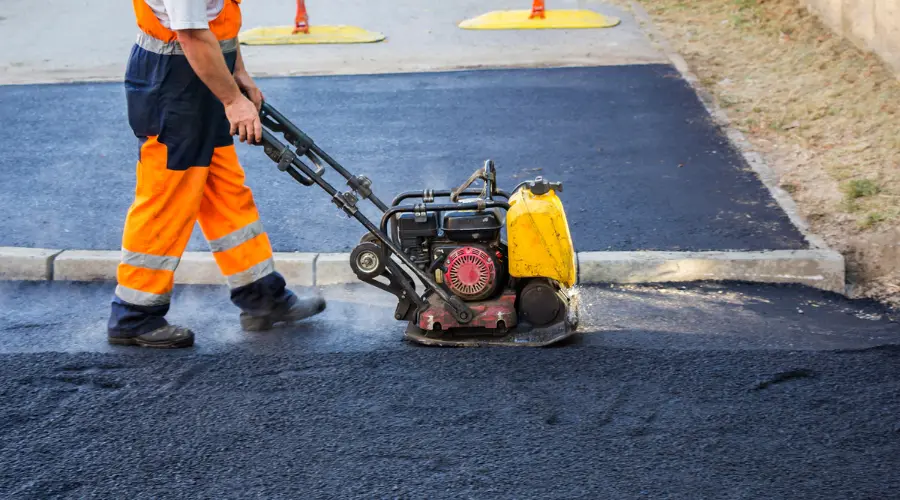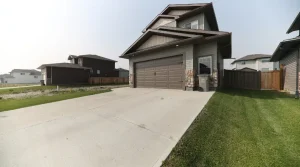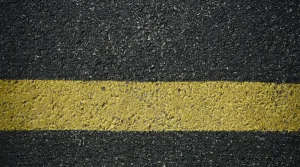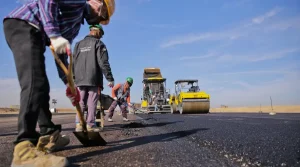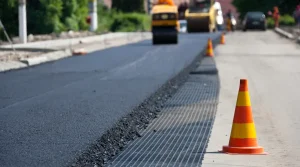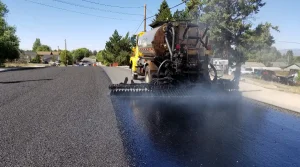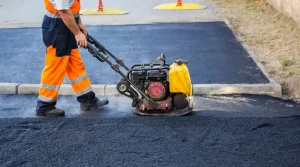Are You Making the Right Surface Choice for Your New Jersey Property?
Are you standing on your cracked driveway wondering if you made the wrong material choice years ago? Or perhaps you’re considering a new installation but feeling overwhelmed by the options? You’re not alone. Property owners across New Jersey constantly debate between asphalt and other pavement options, weighing factors like cost, durability, and appearance.
The truth is, what works for your neighbor’s property might not be ideal for yours. New Jersey’s unique combination of freezing winters, humid summers, and varying precipitation patterns creates specific challenges for outdoor surfaces.
In this comprehensive guide, we’ll unravel the confusion between asphalt and pavement, explore which option stands up best to New Jersey’s demanding climate, and help you make the most cost-effective decision for your specific needs.
Asphalt vs Pavement: Understanding the Terminology
Before diving into comparisons, let’s clear up some common confusion:
- Pavement: This is actually a broad term referring to any paved surface or material used for paving. It includes:
- Asphalt (also called blacktop)
- Concrete
- Brick pavers
- Natural stone
- Gravel
- Permeable pavers
- Asphalt: A specific type of pavement made from aggregates (crushed stone, sand, gravel) bound together by asphalt cement, a byproduct of crude oil refining. It’s recognizable by its characteristic black appearance.
So technically, asphalt is a type of pavement – making “asphalt vs pavement” somewhat like saying “apples vs fruit.” However, when most New Jersey residents use these terms in conversation, they’re usually comparing:
- Asphalt/blacktop: The dark, flexible petroleum-based surface
- Concrete pavement: The light gray, rigid cement-based surface
For clarity, we’ll focus on these two primary options throughout this guide, while touching on alternative pavement choices where relevant.
How New Jersey’s Climate Impacts Your Paving Decision
New Jersey experiences all four seasons distinctly, which creates unique challenges for paved surfaces:
Winter Weather Considerations
❄️ Freeze-Thaw Cycles
- Asphalt: More flexible and less prone to cracking during freeze-thaw cycles
- Concrete: More susceptible to cracking when moisture seeps in and freezes
❄️ Salt & Ice Melt Damage
- Asphalt: Generally resistant to salt damage but can deteriorate with excessive use
- Concrete: More vulnerable to pitting and scaling from deicing chemicals
Summer Weather Considerations
☀️ Heat Absorption
- Asphalt: Absorbs more heat, can become soft in extreme temperatures (but generally not an issue in NJ)
- Concrete: Stays cooler, less heat absorption
☀️ UV Radiation
- Asphalt: Can fade and oxidize over time, requiring sealcoating
- Concrete: Better resistance to UV damage
Year-Round Precipitation Impact
🌧️ Heavy Rain & Drainage
- Asphalt: Can be designed with proper slopes for excellent drainage
- Concrete: Similarly effective when properly installed
- Alternative option: Permeable pavers allow water to seep through, reducing runoff
Cost Comparison: What New Jersey Property Owners Can Expect
When budgeting for your paving project, consider both initial installation and long-term maintenance costs:
Initial Installation Costs for a Standard Driveway (2023 NJ Averages)
| Material | Cost Per Square Foot | Average Total Cost (1,000 sq ft) |
| Asphalt | $7-$13 | $7,000-$13,000 |
| Concrete | $8-$18 | $8,000-$18,000 |
| Pavers | $15-$30 | $15,000-$30,000 |
Lifetime Value Considerations
✅ Asphalt Advantages:
- Lower upfront cost
- Quicker installation (usable within 24-48 hours)
- Easier and less expensive repairs
- Typical lifespan: 15-20 years with proper maintenance
✅ Concrete Advantages:
- Longer lifespan (20-30+ years)
- Less frequent maintenance
- Higher property value impact
- More design options (stamping, coloring, etc.)
Maintenance Requirements & Costs
Asphalt Maintenance Schedule:
- Sealcoating: Every 3-5 years ($0.25-$0.50 per square foot)
- Crack filling: As needed ($1-$3 per linear foot)
- Resurfacing: Every 10-15 years ($3-$7 per square foot)
Concrete Maintenance Schedule:
- Cleaning/pressure washing: Annually
- Joint sealing: Every 5 years
- Concrete sealer application: Every 3-5 years ($0.50-$1.00 per square foot)
Durability Face-Off: Which Surface Lasts Longer in New Jersey?
Traffic Tolerance
🚗 Residential Driveways
- Light vehicles: Both asphalt and concrete perform well
- Heavy vehicles (RVs, boats): Concrete generally handles stationary weight better
🚚 Commercial Properties
- Heavy trucks: Properly installed asphalt with adequate base handles dynamic loading well
- Frequent traffic: Concrete may be more durable for high-traffic commercial entrances
Common Damage Issues
⚠️ Asphalt Vulnerabilities:
- Raveling (loose surface aggregates)
- Alligator cracking
- Edge cracking
- Potholes
- Oil stains (more visible)
⚠️ Concrete Vulnerabilities:
- Corner breaks
- Spalling
- Shrinkage cracks
- Uneven slabs
- Surface flaking
Environmental Considerations for Eco-Conscious Property Owners
Carbon Footprint
- Asphalt: Lower production temperatures mean less energy consumption
- Concrete: Higher carbon footprint during production
Recyclability
- Asphalt: Nearly 100% recyclable; often contains recycled materials
- Concrete: Can be crushed and reused as aggregate, but complete recycling is more difficult
Water Management
- Asphalt: Traditional installations are impermeable
- Concrete: Standard installations don’t allow water penetration
- Better alternatives: Permeable asphalt or concrete pavers for improved stormwater management
Aesthetic Appeal & Property Value Impact
Home Resale Value
💰 What NJ Realtors Say:
- Well-maintained driveways (either material) can boost curb appeal
- Concrete typically adds slightly more value
- Design options (stamped, colored) can increase property appeal
Design Flexibility
- Asphalt: Limited mainly to black; some colored sealers available
- Concrete: Wide range of options including stamped patterns, integral coloring, and decorative aggregates
Installation Timelines & Seasonal Considerations
Best Times for Installation in New Jersey
📆 Asphalt:
- Ideal temperature range: 50-90°F
- Best months: Late spring through early fall
- Avoid: Winter installations (December-March)
📆 Concrete:
- Can be installed in wider temperature range
- Avoid: Freezing temperatures during curing period
- Best months: April through November
Project Duration Expectations
⏱️ Typical Timelines:
- Asphalt driveway: 1-2 days for installation, 24-48 hours before use
- Concrete driveway: 1-3 days for installation, 7+ days before vehicle use
Making the Right Choice for Your Specific Property
Quiz: Which Surface Is Right for You?
✓ Asphalt might be your best option if:
- You’re working with a tighter budget
- You need a quick installation and usage timeline
- Your property experiences harsh freeze-thaw cycles
- You don’t mind more frequent maintenance
✓ Concrete might be your best option if:
- You prioritize longevity over upfront costs
- Design versatility is important to you
- You have vehicles that will be parked long-term
- You prefer less frequent maintenance interventions
✓ Alternative pavers might be your best option if:
- Aesthetic appeal is your top priority
- You’re concerned about water drainage/environmental impact
- You’re willing to invest more for unique design options
- Your property has unique landscaping considerations
Professional Installation Makes the Difference
No matter which paving material you choose, proper installation is crucial for longevity. A poorly installed concrete driveway will fail faster than a properly installed asphalt one, and vice versa.
Key factors that affect installation quality include:
- Proper base preparation
- Adequate drainage design
- Material thickness specifications
- Weather conditions during installation
- Appropriate curing/cooling time
Working with experienced local contractors who understand New Jersey’s specific climate challenges is essential for maximizing your investment.
Conclusion: The Best Choice for New Jersey Properties
While both asphalt and concrete pavement options have their advantages, New Jersey’s climate typically favors asphalt for its:
- Flexibility during freeze-thaw cycles
- Lower initial cost
- Faster installation
- Easier repair options
However, concrete remains an excellent choice for:
- Properties where appearance is paramount
- Areas with minimal freezing concerns
- Homeowners planning to stay long-term
The ultimate decision should be based on your specific property conditions, budget constraints, and long-term plans.
Ready to Upgrade Your Property’s Surface?
Don’t leave your paving project to chance. Contact the experts at Hackensack Paving Company for a free consultation and estimate. Our team specializes in both asphalt and concrete installations, with decades of experience handling New Jersey’s unique climate challenges.
Call Hackensack Paving Company today at (201) 514-6060 to discuss your project needs!

